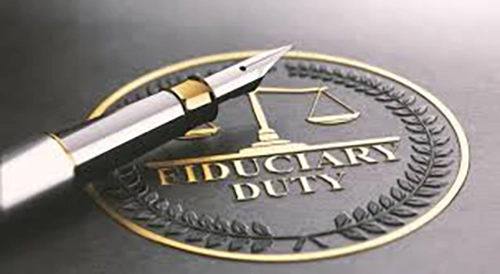Black’s Law Dictionary defines Fiduciary Duty as “a duty of utmost good faith, trust, confidence, and candor owed by a fiduciary (such as a lawyer or corporate officer) to the beneficiary (such as a lawyer’s client or a shareholder); a duty to act with the highest degree of honesty and loyalty toward another person and in the best interests of the other person.”
In the vast ocean of the corporate world, a CEO stands as the captain of their ship, steering the company through calm and turbulent waters. As the leader of a company, the CEO has a critical role in managing the organization’s affairs, and one of the most important aspects of this role is fulfilling their fiduciary duties. These duties are the legal and ethical responsibilities a CEO owes to the company, its shareholders, and its stakeholders. In this post, we will explore the differences in fiduciary duties of a CEO for a healthy company versus an insolvent company.
A. What are Fiduciary Duties?
Fiduciary duties are the legal and ethical obligations that a person in a position of trust, such as a CEO, has to the company and its stakeholders. These duties typically include the duty of care, the duty of loyalty, and the duty of good faith.
- Duty of Care: This duty requires the CEO to make informed and reasonable decisions in the best interest of the company, with the same level of care and diligence that a prudent person would exercise in similar circumstances.
- Duty of Loyalty: The CEO must act in the best interest of the company and its stakeholders, and not use their position for personal gain or to benefit others at the company’s expense.
- Duty of Good Faith: The CEO must act honestly, in good faith, and to promote the company’s best interests.
To Whom Are Fiduciary Duties Owed?
Depending on the situation, your focus and concern change depending on where the company is financially.
As a CEO, your Duties When Solvent, Duties When Insolvent, Duties in the “Zone of Insolvency”, and while in Duties in Bankruptcy, are different and must be observed.
As stated above, Officers and directors owe fiduciary duties to the corporation and its shareholders. Duties When Solvent: When a company is solvent and not in bankruptcy, the fiduciary duties and obligations of officers and directors are not owed to creditors. Duties are designed to protect the interests of shareholders, as the true owners of the company, and prevent self-dealing by management.
Duties When Insolvent: When a shift from solvency to insolvency occurs, the directors’ and officers’ fiduciary duties shift from the shareholders to the corporation’s creditors. Management then must maximize the company’s value for the creditors’ benefit. Directors become trustees of the corporation’s assets for the benefit of its creditors.
Duties in the “Zone of Insolvency”: The theory is that once a corporation enters the zone of insolvency, the directors would owe fiduciary duties to the corporation’s creditors. Delaware courts have decided that a director’s duties are unchanged when a corporation is in the zone of insolvency. The Board should document its decisions during this period and the advice it receives from legal and financial advisors to maintain the protections of the business judgment rule.

Duties in Bankruptcy: The prepetition management of the debtor-in-possession remains in control and is expected to carry out the fiduciary responsibilities of a trustee in bankruptcy. The debtor-in-possession is a fiduciary for the entire estate and must manage all estate property for the benefit of the estate and the estate’s creditors and other stakeholders. Directors and officers are required to act in a manner that will maximize the corporation’s value for all of its residual interest holders—both shareholders and creditors.
Business Judgment Rule: The business judgment rule is a presumption in favor of the validity of a business decision. In applying the business judgment rule, the following four elements must be satisfied:
- Director disinterestedness
- Active decisions
- Good faith
- Informed decisions
B. Fiduciary Duties of a CEO for a Healthy Company
When a company is healthy and financially stable, the CEO’s primary fiduciary duties are to the company’s shareholders. The CEO is expected to make decisions that maximize shareholder value and ensure the company’s long-term success. This may involve expanding the business, investing in new products or services, and managing the company’s financial resources effectively.
In this scenario, the CEO must also consider the interests of other stakeholders, such as employees, customers, and the community. However, the primary focus remains on maximizing shareholder value, and the CEO’s actions should be guided by this principle.
C. Fiduciary Duties of a CEO for a Distressed Company are different
When a company is in financial distress or becomes insolvent, the CEO’s fiduciary duties expand to include the company’s creditors. This is because the company’s assets are no longer sufficient to cover its liabilities, and the creditors have a legal claim to the company’s assets.
- Duty of Care
- Duty of Loyalty
- Duty of Disclosure
- Duty of Oversight
Duty of Care
The Duty of Care requires directors and officers to conduct their duties:
- In good faith
- In a manner that the director reasonably believes to be in the best interests of the corporation
- Duty of care – gross negligence standard
Duty of Loyalty
Whether the director acted with unbiased judgment for the benefit of the corporation or whether the director instead made decisions with his or her interests in mind.
Obligation to act in good faith requires that directors not:
- Consciously act with an intent other than to advance the best interests of the corporation
- Intend to violate applicable law or fail to meet other applicable duties Consciously disregard such duties
Duty of Loyalty
Whether the director acted with unbiased judgment for the benefit of the corporation or whether the director instead made decisions with his or her interests in mind
Obligation to act in good faith requires that directors not:
- Consciously act with an intent other than to advance the best interests of the corporation
- Intend to violate applicable law or fail to meet other applicable duties
- Consciously disregard such duties
Duty of loyalty cases usually involve:
- Transactions between two corporations having common directors
- Transactions between the corporation and one or more of its directors
- Appropriation of a corporate opportunity
- Executive compensation agreements
Duty of disclosure – the obligation to make disclosures to stockholders about any relevant information that falls under the board of directors’ control
Duty of oversight (also called duty of oversight and good faith) – examines the directors’ actions in monitoring the corporation’s affairs
In this situation, the CEO must balance the interests of the shareholders and the creditors, ensuring that both parties receive fair treatment. This may involve restructuring the company’s debt, negotiating with creditors, and making difficult decisions to preserve the company’s assets and minimize losses.
Things to consider in case of a Breach of Fiduciary Duty
To state a cause of action for breach of fiduciary duty, the plaintiff must prove that:
- The defendant owed a fiduciary duty and
- The defendant breached that duty
Plaintiffs often bring actions against officers and directors for breaches of the fiduciary duty of care and loyalty. Deepening insolvency is a theory that seeks to hold officers, directors, and professional advisors liable for prolonging the existence of a financially distressed company. Under Sarbanes-Oxley, directors and officers of public companies are at heightened risk of claims for breaches of fiduciary duty:
- Directors’ or officers’ failure to meet heightened SEC reporting requirements may constitute breaches of the duty of care owed to the corporation.
- Failure to comply with Sarbanes-Oxley’s prohibition on personal loans may provide the basis for claims of breach of the duty of loyalty.
Limiting Liability
Indemnify directors and officers. Most states have indemnification statutes that protect directors and officers who are sued in their capacity as managers of the corporation. Indemnification may be either mandatory or permissive.
Purchase D&O insurance. A corporation may purchase D&O liability insurance to cover any indemnification obligations and to cover directors and officers concerning non-indemnifiable claims. (At some point, I will have an entire post on the importance of insurance, the types of insurance you should carry, and when you should prioritize affording it.)
Limit director liability in corporate documents. In some jurisdictions, a corporation can exculpate directors for breaching the duty of care, which is accomplished through the inclusion of an exculpation provision in the certificate of incorporation.
Best Practices
Best practices for directors to protect themselves from creditor claims for breach of fiduciary duty can be a real lifesaver! Here are some practical tips to keep in mind:
- Acknowledge and address the competing financial interests among various parties, including secured creditors, unsecured creditors, and shareholders. It’s like a financial version of a group hug – everyone feels included and less likely to start a mutiny.
- Keep and maintain those board meeting minutes – never lose them! They’ll be your best defense in case of any legal challenges. In some cases, recordings should be kept for clarification and reference.
- If you’re a board member who’s also a creditor and shareholder, it’s best to abstain from voting. You don’t want to be accused of playing favorites – that’s a surefire way to end up in hot water!
- Make a genuine effort to locate potential buyers for the debtor’s assets, especially if only insiders have expressed an interest.
When it comes to being insolvent (or approaching it), here are some best practices to keep in mind:
- Review (or have legal counsel review) state law concerning the definition of insolvency and the directors’ duties.
- Determine if the company is insolvent or in the “zone of insolvency.” You need to know if you’re heading into a storm.
- Rely on the advice of financial advisors, other professionals, and officers of the corporation to determine if the company is insolvent.
- Pursue strategies to maximize the value of the corporation for the shareholders or creditors, as applicable, and consider how they will impact the corporation’s creditors. It’s like playing chess – always think a few moves ahead. I can’t emphasize this enough: you must think ahead.
- Document the rationale for all actions by the board that could impact the corporation’s financial condition. It’s like keeping a diary – you never know when you might need to look back and remember what happened on a certain day. I am old school; I always keep written notes.
By following these best practices, directors can minimize the risk of facing a breach of fiduciary duty claim from creditors and keep their reputations intact. It’s a win-win situation for everyone involved.
Conclusion
The CEO’s fiduciary duties are crucial to the success and survival of a company, and they evolve as the company’s financial health changes. In a healthy company, the CEO’s primary focus is on maximizing shareholder value, while in an insolvent company, the CEO must also consider the interests of the company’s creditors. Navigating these complex responsibilities requires a delicate balance of legal and ethical considerations, and the CEO must act with care, loyalty, and good faith to ensure the best possible outcome for all parties involved.
Sources: LexisNexis and my brilliant white shoe attorney. Just to let you know, I am not an attorney, but I have studied much of the law, especially regarding business. There are entire books written on this topic. For example, The Business Judgment Rule: Fiduciary Duties of Corporate Officers, Sixth Edition (Volume of 4) 6th Edition
